| |
|
|
|
|
Colonial Family Quick Links
|
|
|
|

|
|
|
|
|
Family C-2: Yatterina
 |
This family descended from a mare named Brunette, by Bay Camerton, the latter imported around 1828; her dam's name and history is unknown, although Barrie speculated she was born in Cumberland County and was by one of the good stallions there--Old Hector, Model, or a son of imported Northumberland. Brunette was bred to the important early imported stallion Steeltrap a year before his death, when he stood at Charles Smith's Bungarribee stud at Eastern Creek, producing the filly Flirt (1834). Flirt was bred to Gratis, another important early imported sire not long after he was purchased by the Busby brothers and installed at the Dalkeith Stud in the Munmurra district in Bligh County. Her daughter from this breeding, Kate, was bred to the colonial-bred Vanguard (1849, Aether-The Giggler), probably at the Tocal Stud (along the Paterson River) of Charles Reynolds; the resulting filly Koh-i-noor, born around 1855, became the dam of Yatterina in 1865.
Yatterina was bred by County Mayo-born Walter McEvilly (1820-1867), transported to Sydney in 1840 after conviction for forgery in Tipperary, Ireland. Living principally in Sydney, he received his ticket-of-leave in 1844, and served as assistant and then principal librarian for the Australian parliament from 1843 until his death in 1867, and was active in politics concerning Catholic rights in the colony. McEvilly raced, and probably trained, the great colonial-bred sire, Yattendon (1861) under the nom-de-course "Mr. O'Malley," and used Yattendon, winner of the AJC Sydney Cup and other good races, as a stallion while he was still in training. Yatterina was Yattendon's first recorded foal, born in 1865 and bred by McEvilly, who also bred the top 1870s racehorse Dagworth. McEvilly's death in 1867 was the result of a fall from a horse in an informal race at Moss Vale. Yattendon eventually became the foundation stallion at the famous E.K.Cox stud at Fernhill, Mulgoa. Yatterina, age two, at the time of McEvilly's death, was purchased by William Walters, owner of Glenora Park Stud, Papakura (New Zealand) and one of the best known owners and breeders of racehorses in Auckland, his reputation in no small part due to Yatterina and her offspring.
Running for Walters, Yatterina became a famous racehorse, closely tied to the early development of racing in New Zealand. At the inaugural meeting of the Auckland Turf Club at Ellerslie, December 26 and 27, 1873, she was there. She ran second by 1-1/2 lengths in the Turf Club Cup over two miles the first day, and the next day won the first New Zealand Cup over a mile. Credited with "upwards of 60 wins," over all distances in almost every racing venue in New Zealand, Yatterina was an exceptionally sturdy and successful runner to the age of ten, that year winning the Dunedin Jockey Club Handicap carrying 9 st-3 lbs., and the ARC Easter Handicap, dropping her first foal, Libeller (see below) by Traducer, not long after the latter race. Her success on the turf was equalled by her success as a broodmare at Walters' Glenora Park Stud, producing twelve foals by seven different sires before her death at age 25, and establishing this incredibly prolific and successful female family numbering many good racemares that, like Yatterina, went on to successful careers in the breeding shed.
Walters retained many of Yatterina's progeny for racing, and won a number of important New Zealand races with them. Yatterina's sons were Libeller (1876, by Traducer), a grand stayer (see below); Musketeer (1880, by Musket); and Fusilier (1881, by Musket), winner of the Wanganui Jockey Club Derby and Wanganui Stakes, among other races, and later a stallion at Thomas Cook's Turanville Stud in Australia's Hunter Valley. Matchlock, born a year after Fusilier (1882, by Musket), sold to the famous Hunter Valley sportsman James White, won six races -- including the VRC St. Leger, the Australian Cup, the VRC Champion Stakes, the AJC St. Leger and AJC King's Plate -- in twelve starts, after which he was sold to India. Yatterina's next son, Kingfish (1883, by Piscatorious) was another good one, winner of the Hawkesbury Guineas over a mile in record time and the QTC Stand Plate, and placed in other important races, including the AJC Derby, St. Leger and Craven Plate, and in New Zealand's Great Northern Derby. Her next son, Firelock (1885, by Musket) won races in Gippsland, Victoria. Her last son, Pinfire (1886, by Torpedo, a Musket son), won the ARC Auckland Cup, the Grand Stand Handicap and other races for Walters. None of these horses made a mark in the stud; that duty fell to her daughters, one of which was also a good race mare.
Leorina (1884, by Leolinus), was Yatterina's best racing daughter. Retained by Walters, and like her dam a great weight-carrier, for him she won the ARC Easter Handicap carrying 11 st - 10 lbs. and the Ladies' Bracelet ("for gentlemen riders") twice, carrying 12 st- 2 lbs., and placed in other good Auckland Racing Club races. In the 1892 Onslow Cup Leorina ran second, and her half-brother Pinfire was third. Leorina produced St. Mark (1896, by St. Leger), a winner of the Wanganui Guineas, but her female line did not breed on. Likewise, Yatterina's daughters Sleep (1887, by Somnus) and Yarranabbee (1889, by Hippocampus, purchased to Australia), neither of much use on the turf, failed to breed on. However, Rosarina (1877, by Traducer) and Hipporina (1878, by Hippocampus), both established very successful female lines through several daughters still winning stakes races today. Rosarina's daughter Vieux Rose (1888, by Hippocampus), bred by Walters and sold to the Lennard family at Te Aroha, won races and produced two good stakes winners, including Auckland Cup winner Santa Rosa (1905) and daughters that bred on. Hipporina bred the Avondale Cup winner Ingorina (1886) and other daughters that bred on; her great-grandaughter, March (1912, by Marble Arch), dam of the champion filly Queen March and of two-time Auckland Cup winner Te Kara, did much to revitalize the family in the 20th century through her daughters.
|
Notable Descendants
|
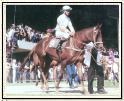
|
| Battle Eve
|
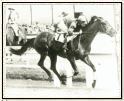
|
| Chatspa
|
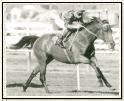
|
| Commissionaire
|
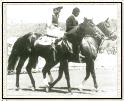
|
| Kirrama
|
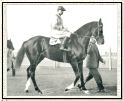
|
| Limarch
|
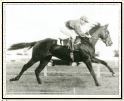
|
| March Legend
|
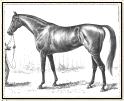
|
| Matchlock
|
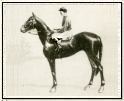
|
| Te Kara
|
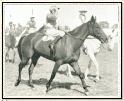
|
| Tomito
|
|
|
All Gold ch.f. 1961
(Star Kingdom - Regal Gold)
Won the AJC Wiidden Stakes in record time, and two other races, and was second in the AJC Gimcrack Stakes. Sent to the Kentucky, where she was a successful dam of long-running stakes winners, including Into Gold (1967), Etched in Gold (1977), and Royal Dan (1979); many of her daughters bred on, producing such horses as the half-brothers Lot o' Gold (1976, Kentucky Jockey Club Stakes, Clark Handicap, etc.), Golden Derby (1978, Tremont Stakes, Olympia Stakes, Phoenix Handicap, etc.), and Captain's Gold (dam's sire of 2002 Golden Slipper winner Calaway Gal), and this branch is still active today, mostly in the U.S. Her half-sister, Regal Peace (1959, by Pipe of Peace) won the VATC One Thousand Guineas and the AJC December Stakes, and was second in the VRC Oaks Stakes, and was later dam of the long-running gelding Regal Rhythm, winner of 21 races, including the Tattersall's Club Gold Cup, AJC George Main Stakes (8 furlongs, twice), and the STC Rawson Stakes (9 furlongs, twice); her descendants are also still winning, including the excellent sprinter Miss Pennymoney, winner of the Australia Stakes in 2000, and five other stakes races.
Battle Eve ch.f. 1970
(Battle-Waggon - Summer Eve)
Bred at the Brown family's Ancroft Stud, Matamata (New Zealand), she was by champion sire imp. Battle-Waggon, who stood at Ancroft. She was a good racemare, winning 25 races to age six, her best distance 8 furlongs. Her wins included the ARC Great Northern Foal Stakes at age two, the Bay of Plenty Japan-Bay of Plenty International Trophy, the ARC King's (now Darley) Plate twice, and the Thames Valley Stakes; she was also second in the CJC New Zealand One Thousand Guineas. She bred seven winners from eight foals for Ancroft Stud, including Balmereve (1981, 4 wins) and King Delamere (1980), winner of the VATC Memsie Stakes, the VATC Norman Robinson Stakes and eight other races at distances up to 12 furlongs and A$265,660. As a sire King Delamere got some stakes winning middle distance runners. Balmereve bred on; her great-grandaughters, Irish Darling (2001) and Dragon Maid (2000) are both recent stakes winners. Battle Eve's dam, Summer Eve (1954, by Summertime) won two races at six furlongs and then proved an outstanding broodmare, dam also of Major Battle (1971, 5 wins at 10 to 12 furlongs, including the STC HE Tancred Cup); Crest Star (1974, winner of Hawkes Bay Guineas and ARC Great Northern Guineas); Commissionaire (see below), and the unraced Ancroft Lass (1972), dam of Reputed (1982, 11 wins and A$268,337) and daughters with descendants still winning stakes today.
Chatspa br.g. 1942
(Chatham - Amalspa)
Bred in Australia (his second dam was Spasette, dam of Tomito (see below)), his successes were in southern Australia, mostly after the age of four, although he dead-heated for the Port Adelaide Guineas at age three. His big wins were the Tasmanian Racing Club's King's Cup over 12 furlongs, the ten furlong Adelaide Racing Club's Parkside Stakes, and the AdelRC 13 furlong Birthday Cup an unprecedented three times--in 1947, 1949, and 1950; the Chatspa Handicap is named in his honor. His sister, Miss Damper (1947), won the SAJC Sires' Produce Stakes and the South Australian Stakes.
Commissionaire c. 1977
(So Vain - Summer Eve)
Bred by the Brown family at Ancroft Stud, Matamata, NZ from their good foundation broodmare Summer Eve (see Battle Eve, above). Long-running, gritty miler won 21 races and NZ$298,940 at distances between 7 and 10 furlongs; he showed promise at age three, placing second in the Canterbury Gold Cup, but it wasn't until the 1982-83 season that he emerged as the best weight-for-age runner in New Zealand. His wins included the 1983 Canterbury Gold Cup, the New Zealand International Stakes (three times), the Awapuni Gold Cup, the Ormond Memorial Stakes, and the Cambridge Stud International Stakes (twice), in addition to other G2 and G3 races. Trained by Noel Eales, his regular jockey, Jim Cassidy, described him as "the gutsiest fighter" he had ever ridden.
Kirrama blk.c. 1967
(Sobig - Bann)
Bann, useless on the track, was given to one-time leading trainer George Greene from Takanini ; she was bred to Sobig, and the resulting colt, Kirrama, was raced by Greene's widow, Muriel, and trained by his niece, Marlene Todd. At age three he won a couple of minor events before failing to place in the Wellington Guineas; after that he won the Waikato Guineas and the ARC Great Northern Derby, the WRC Trentham Stakes, and three handicaps in succession. A shoulder injury side-lined him for two months, and he came back to win the BoPRC Invitation Stakes, but could not place in the Great Northern St. Leger or the Ormond Memorial Gold Cup. Named Horse of Year and top of the Free Handicap, rated 9 st.-8 lb. He ran for two more years with only one win at age five and retired to Progressive Farms, Karaka, where he got the good stayer Secured Deposit (Auckland Cup, Wellington Cup, New Zealand St. Leger) and some other good ones before his death in 1985. His third dam, Marchette, established a branch of the Yatterina family still breeding stakes winners today, including the good sprinting gelding Court's in Session (1999) and classic winner Rom's Stiletto (1982, VATC One Thousand Guineas, VRC Oaks), both descending from her daughter First Flutter.
Libeller b.c. 1876
(Traducer - Yatterina)
The first foal of Yatterina, bred and raced by William Walters, he had a long and successful career on the New Zealand turf, winning the Great Northern Derby Stakes (12 furlongs) at age three, and in later years went on to win the Auckland Plate (16 furlongs) and ARC Handicap (14 furlongs, after falling two days earlier in the Auckland Cup, when his jockey was killed), the Dunedin Cup, and other races, in the course of which he beat many good horses, such as Kenilworth and Sir Modred.
Limarch blk. c. 1930
(Limond - Queen March)
Bred in New Zealand from the brilliant top money-winning juvenile Queen March, and by the leading sire Limond, he was purchased to Australia, where he was among the top juveniles and three year olds of his generation. At age two he showed great promise in a heavy season, winning the AJC Breeders' Plate, a race at Warwick Farm (Sydney), and the AJC Kirkham Stakes. He was third, conceding weight, in the December Stakes at Randwick, and fourth to L'Elite in the Sires' Produce Stakes, and second to Hall Mark, giving him 11 lbs., in a race at Warwick farm, and a close third to L'Elite and Hall Mark in the Flemington Stakes, giving the winner 19 pounds. At age three he won the AJC Hobartville Stakes, and then proved he could stay by winning the 14 furlong AJC St. Leger and dead-heating with Hall Mark for first in the VRC St. Leger Stakes. Retired to stud in Australia, he was not a successful stallion. His dam, Queen March (1920, by Lucullus), owned by Hon. Eliot Davis, was a record-setting juvenile money winner in New Zealand, winning the ARC's Great Northern Champagne Stakes, Royal Stakes and Welcome Stakes, the WRC Wellesley Stakes, and the Anganui Debutante Stakes. She started to bleed during her 3 year old season, and was retired to the breeding shed, where she got Limarch and a daughter, Queen City, that bred on.
Lou Rosa br.c. 1937
(Gay Shield - Lucy Rose)
Good juvenile and three-year-old, later developing into a consistently tough stayer and weight-carrier that ran to age eight. He was overshadowed by the great Kindergarten early in his career. He was bred and raced by Arthur Lennard at Waihou, near Te Aroha. His fourth dam, Vieux Rose (1888, by Hippocampus) had been bred by William Walters and purchased by Mrs. John Lennard, for whom she won her first race. Her daughters, all bred by the Lennards, continued the family line; Lou Rosa's dam, Lucy Rose (1925, by Lucullus), won some races. Lou Rosa won three races as a juvenile, including the ARC Great Northern Foal Stakes. At age three he won several open handicaps, and was second to Kindergarten by 3/4 of a length in the Great Northern Derby, and a heart-breaking second to Kindergarten in the Great Northern St. Leger by a short neck. At age four he won the ARC Clifford Plate, also running third in the Auckland Cup. At age five he took the ARC Handicap, the Clifford Plate a second time, and the ARC Mitchelson Cup with the high weight of 9 st.-4 lb; he also ran second in the Auckland Cup that year, beaten by Kindergarten (who won in record time). At age six he was third in the Auckland Cup. At ages seven and eight he won the ARC Mitchelson Cup and the ARC Presidents Handicap, both with heavy weight, and the Avondale King George Handicap, carrying 9 st.-10 lb. His half-brother, the gelded Mr. Rosa (1940, by Foxbridge), won the ARC Alison Cup among other races.
Te Kara b.c. 1918
(General Latour - March)
Good staying winner in both New Zealand and Australia, he was owned and raced by Martin Tims, a prominent breeder and owner based at Te Awamutu, NZ, whose brother, Jack, was president of the Matamata Racing Club. Martin's son, Buster Tims, continued the family tradition with a number of successful race horses well into the late 20th century, and his nephew Bill was prominent in steeplechasing circles. Initially trained by G. Paul at Te Awamutu, Te Kara's first win was the Cornwall Handicap at Auckland, after which he went on, lightly weighted, to the Auckland Cup of 1923, where he dead-heated for the win with another feather-weight, Muraahi. The next year he won Auckland's Autumn Handicap and beat the excellent staying mare Gold Light in the Auckland Cup, becoming a rare two-time winner of that race. The next season he won the Herries Memorial Cup at Te Aroha and the WRC Champion Plate, and ran second to The Banker in the New Zealand Cup, after which he was taken to Australia, where he won the City Tattersall's Cup (Sydney) and the Brisbane Cup in Queensland. Back in New Zealand, he ran second in the Te Awamutu Cup in 1926 and won the Avondale Cup in 1927, trained by the Te Awamutu trainer Alec Cook, who also schooled other Tims horses with great success. In all, he won over £6,000. His dam, March was responsible for reinvigorating the Yatterina family, with four daughters that bred on, including the brilliant Queen March, dam of Limarch (see above).
Tomito b. c. 1935
(Inchaquire - Spasette)
Bred and raced in Australia, and owned and trained by John F.G. Robinson (who also schooled two other Perth Cup winners) and J.L. Stewart, he was a good stayer in Western Australia at age three, winning the WATC St. Leger and the Perth Cup (16 furlongs) at Ascot Racecourse. The Tomito Handicap over 1900 meters at Belmont is named in his honor. His half-sister, Amalspa, produced Chatspa (see above).
Wairiki b.c. 1899
(Soult - Rose and White)
Bred by William Walters at Glenora Park, this great stayer was sold to Sam Bradley, who put him in training with J. McHugh. Atypically large for a Soult offspring, he was slow to mature, first hitting the boards with a win in the Victoria Handicap, his third start as a juvenile. As a three-year-old he won the AvJC Avondale Guineas and the ARC Great Northern Guineas, then showed he could stay by winning the Auckland Summer Cup. He went on to win the ARC Great Northern Derby Stakes, after which he ran second in the Royal Stakes, and at Auckland Easter meeting was second in the St. George's Handicap, and then went on to win the 1-1/2 mile Autumn Handicap carrying 9 st-5 lb. As a four year old he won the North Otago Handicap and was second to St. Denis in the Otago President's Handicap, and was beaten by a length by Canteen in the New Zealand Cup, although Canteen had interfered with the running. He went on to Ellerslie to win the Auckland Cup, wire-to-wire, carrying 9 st.-8 lbs, hailed at the time as a spectacular win second only to Carbine's Melbourne Cup. He then was shipped to Australia and started favorite in the Melbourne Cup, but slipped and broke his shoulder during the running and was sent back to New Zealand to begin his stud career, which was not successful, getting only a couple of stakes winners that won at 10 furlongs. His full sister, Soult Rose (1902) was a conduit for a main branch of the Yatterina family: Commissionaire (1977, see above) and Irish Darling (2001, by Ivory's Irish), winner of the SAJC Australasian Oaks and the SAJC South Australian Oaks in 2005 are recent representatives of this branch.
|
|
Bold=winners of stakes races and important handicap and weight-for-age races
Brunette by Camerton
Flirt (f.) by Steeltrap
Kate (f. 18-) by Gratis
Koh-I-noor (f.) by Vanguard
Yatterina (b.f. 1865) by Yattendon
Libeller (b.c 1876) by Traducer
Rosarina (b.f. 1877) by Traducer
| Cressina (f. 1885) by Leolinus
| | Cressy (g. 1898) by Soult
| | Cressy (f. 1891) by Hippocampus
| | Zennie (f. 1908) by Seaton Delaval
| | Gold Minting (f. 1921) by Day Comet
| | Lady Nenagh (f. 1939) by Raceful
| | Sea Wonder (f. 1957) by Able Seaman
| | Rhonela (f. 1971) by Aureate
| | Paper Sail (f. 1976) by George Spelvin
| | River Road (ch.c. 1981) by Whiskey Road
| Vieux Rose (br.f. 1888) by Hippocampus
| | Roxana (br.f. 1895) by Cuirassier
| | | Annapolis (br.g. 1903) by Phoebus Apollo
| | | Waimangu (br.c. 1905) by Soult
| | Val Rosa (b.c. 1897) by Seaton Delaval
| | Alba Rose (b.f. 1900) by Seaton Delaval
| | | Autumn Rose (br.f. 1909) by Soult
| | | Lucy Rose (br.f. 1925) by Lucullus
| | | | Lou Rosa (br.c. 1937) by Gay Shield
| | | | Mr. Rosa (g. 1940) by Foxbridge
| | | Gay Rose (blk.f. 1930) by Lucullus
| | Santa Rosa (blk.c. 1905) by Soult
| Rose and White (ch.f. 1890) by Nordenfeldt
| Wairiki (b.c. 1899) by Soult
| Soult Rose (f. 1902) by Soult
| Rosullus (f. 1916) by Lucullus
| Glittering (f. 1930) by Kilbroney
| Pink and White (f. 1939) by Vaals
| Summer Eve (f. 1954) by Summertime
| Battle Eve (ch.f. 1970) by Battle-Waggon
| | King Delamere (b.c. 1980) by Balmerino
| | Balmereve (f. 1981) by Dulcie
| | Evening Line (b.f. 1986) by Sir Tristram
| | Hellriegel (b.f. 1992) by Chirstmas Tree
| | | Dragon Maid (br.f. 2000) by Mughtanim
| | Sandy Darling (ch.f. 1994) by Geiger Counter
| | Irish Darling (ch.f. 2001) by Ivory's Irish
| Major Battle (c. 1971) by Battle-Waggon
| Ancroft Lass (f. 1972) by Battle-Waggon
| | Classy Gem (f. 1976) by Precious Will
| | | Miss Etoile (f. 1982) by Danseur Etoile
| | | Zetoile (b.f. 1988) by Balmerino
| | | Pacific Gem (f. 1989) by Kaapstad
| | | | Pacific Dancer (br.g. 2000) by Groom Dancer
| | | Kapetoil (ch.f. 1990) by Kaapstad
| | | Kapiston (ch.f. 1998) by Lake Coniston
| | Indispute (br.f. 1978) by Copenhagen
| | | Havelock's Pride (ch.c. 1984) by Gondolier
| | | Baskerville (br.c. 1989) by Bassenthwaite
| | | Betty Behave (b.f. 1991) by Centaine
| | | Sparks (b.g. 1997) by Thunder Gulch
| | Reputed (b/br.c. 1982) by Diagramatic
| Crest Star (c. 1974) by Crest of the Wave
| Commissionaire (c. 1977) by So Vain
Hipporina (br.f. 1878) by Hippocampus
| Muskerina (br.f. 1885) by Musket
| | Bellona (f. 1890) by Nelson
| | | Matamata Harakiki (f. 1897) by St. Leger
| | | | Musette (f. 1907) by Cuirassier
| | | | Hine Pango (f. 1913) by All Black
| | | | Brown Pearl (f. 1928) by Thespian
| | | | Patunui (f. 1943) by Coronach
| | | | Sahnui (f. 1952) by Perozshah
| | | | Blue Shaun (f. 1958) by Blue Coral
| | | Bona (f. 1898) by St. Hippo
| | | Ellen Terry (f. 1909) by Playbill
| | | Spasette (f. 1919) by St. Spasa
| | | Inoyi (g. 1928) by Amalfi
| | | Amalspa (f. 1931) by Amalfi
| | | | Chatspa (br.g.1942) by Chatham
| | | | Miss Damper (f. 1947) by Chatham
| | | Amalette (f. 1934) by Amalfi
| | | Tomito (c. 1935) by Inchaquire
| | Lady Musket (br.f. 1895) by Blairgowie
| | Salute (br.f. 1906) by Soult
| | | First Salute (c. 1915) by Marble Arch
| | | Arch Salute (g. 1916) by Marble Arch
| | | Soot (br.f. 1918) by All Black
| | | | Queen's Salute (ch.f. 1927) by Chief Ruler
| | | | Salutation (gr.f. 1938) by Theio
| | | Curtsey (f. 1923) by Limond
| | | Snow Queen (f. 1935) by Beau Pere
| | | My Miss (f. 1944) by Manitoba
| | | Viola (br.f. 1954) by Video
| | | Vina (br.f. 1967) by Vittor Pisani
| | | Vina Rock (ch.f. 1977) by Rocky Thumb
| | King Soult (c. 1907) by Soult
| | March (blk.f. 1912) by Marble Arch
| | Te Kara (b.c. 1918) by General Latour
| | Queen March (blk.f. 1920) by Lucullus
| | | Limarch (blk.c. 1930) by Limond
| | | Queen City (br.f. 1937) by Iliad
| | | City Queen (b.f. 1951) by Double Chance
| | | Loma Linda (b.f. 1957) by Calm Courage
| | | Delkaren (f. 1966) byAyrshire Bard
| | | | El Dufus (b.g. 1976) by El Mondo
| | | Judena (blk.f. 1976) by Zephyr Bay
| | Lady March (f. 1922) by Lucullus
| | | Marching (f. 1929) by Lapidary
| | | Te March (f. 1941) by Foxbridge
| | | | Straight Lace (br.f. 1954) by Marco Polo
| | | | | Gretel (f. 1960) by Golovine
| | | | | Kaitaia (br.f. 1968) by Powerhouse
| | | | | | Guerilla (b.g. 1982) by Mussorgsky
| | | | | March Legend (br.c. 1972) by Idomeneo
| | | | Straight Jacket (f. 1955) by Marco Polo
| | | | | Kerrabee (f. 1960) by Resurgent
| | | | | Kerry Scot (b.f. 1968) by Arctic Explorer
| | | | | Gwendolyn Girl (ch.f. 1977) by Crazy Rhythm
| | | | | Prince Rupert (b.g. 1989) by Passive Knight
| | | | Straight Irish (g. 1956) by Pride of Kildare
| | | | Straight Time (g. 1958) by Summertime
| | | Quick March (c. 1944) by Balloch
| | Royal March (br.f. 1924) by Lucullus
| | | Avail (br.f. 1935) by Appellant
| | | | All Square (br.f. 1940) by Dink
| | | | Ides of March (br.f. 1960) by Pont d'Or
| | | | Full o'Tricks (b.f. 1970) by Trictrac
| | | | | Isle of Man (b.c. 1978) by Habitation
| | | | Cheval de Trics (f. 1973) by Trictrac
| | | | My Goodness Me (br.f. 1983) by Norfolk Air
| | | | | Rebel (ch.g. 1993) by Famous Star
| | | | Shelley Lack (f. 1987) by Prince Echo
| | | | Doyle (b.g. 1995) by Dance Floor
| | | Royal Tray (b.f. 1936) by Tea Tray
| | | | Regal March (f. 1941) by Dink
| | | | | Regal Gold (br.f. 1947) by Gold Nib
| | | | | Regal Peace (br.f. 1959) by Pipe of Peace
| | | | | | Regal Rhythm (b.g. 1964) by Sostenuto
| | | | | | Regal Crest (br.f. 1969) by Sostenuto
| | | | | | | Game Dam (ch.f. 1979) by Bold Aussie
| | | | | | | Bold Promise (ch.f. 1988) by Luskin Star
| | | | | | | Merlene (b.f. 1993) by Danehill
| | | | | | | Miss Pennymoney (ch.f. 1996) by Brocco
| | | | | | Current Affair (br.f. 1970) by Sostenuto
| | | | | | Food for Love (br.f. 1978) by Lunchtime
| | | | | | Lady Jakeo (b/br.f. 1990) by Last Tycoon
| | | | | All Gold (f. 1961) by Star Kingdom
| | | | | Into Gold (dkb/br.c. 1967) by Jacinto
| | | | | Old Goldie (gr.f. 1970) by Young Emperor
| | | | | | Lot o' Gold (gr. c. 1976) by Lothario
| | | | | | Golden Derby (gr. c. 1978) by Master Derby
| | | | | | Goldmist (gr. f. 1980) by Master Derby
| | | | | | | Table Limit (b.c. 1987) by Spend a Buck
| | | | | | Captain's Gold (gr. c. 1981) by Riverman
| | | | | Etched in Gold (ch.f. 1977) by Blade
| | | | | Gold Etching (ch.f. 1978) by Blade
| | | | | | Derby Etching (ch.c. 1984) by Master Derby
| | | | | | Draw Gold (g. 1986) by Bob's Dusty
| | | | | | My Girl Denna (ch.f. 1989) by State Dinner
| | | | | Royal Dan (gr. c. 1979) by Blood Royal
| | | | Regal Tray (ch.f. 1949) by Balloch
| | | | Silverdale March (ch.f. 1960) by Chatsworth
| | | | Regal Band (br.f. 1973) by Bandmaster
| | | | Banderol (b.g. 1981) by Jubilee Wine
| | | Route March (b.c. 1938) by Vaals
| | Marchette (br.f. 1928) by Limond
| | First Flutter (ch.f. 1935) by Captain Bunsby
| | | Mahzami (gr.f. 1944) by Nizami
| | | Jalna (ch.f. 1955) by Count Rendered
| | | Jalna's Lass (b.f. 1962) by Golovine
| | | Sabot (b.f. 1969) by Le Cordonnier
| | | | Show Shoes (b.f. 1974) by Showdown
| | | | Rom's Stiletto (gr.f. 1979) by Sharp Edge
| | | L'Adelene (b.f. 1973) by Le Cordonnier
| | | | Brave Pride (ch.f. 1978) by Vain
| | | | Markatie Pride (b.f. 1986) by Seventh Hussar
| | | | Court's in Session (b.g. 1999) by Bureaucracy
| | | Shalna (f. 1978) by Shifnal
| | | Nassabelle (ch.f. 1989) by Nassipour
| | | Frightening (b.c. 1999) by Langfuhr
| | Constant Lady (b.f. 1940) by Mr. Standfast
| | | Persia (gr.c. 1944) by Nizami
| | Dona Marcheta (f. 1946) by Ruthless
| | | Norvic Leader (ch.g. 1956) by Genetout
| | Silver Oak (br.f. 1949) by Underwood
| | Bann (blk.f. 1954) by Gabador
| | Kirrama (blk.c. 1967) by Sobig
| Ingorina (c. 1886) by Ingomar
| Hotcherina (f. 1893) by Hotchkiss
| Albuera (f. 1897) by Soult
| | Flay (f. 1912) by Flavus
| | Switch (f. 1918) by Flippant
| | | Flail (g. 1927) by Comedy King
| | Patois (f. 1927) by Magpie
| | Trieste (f. 1933) by Constant Son
| | Sweet and Low (f. 1942) by Double Remove
| | Alouette (f. 1950) by High Caste
| | | Icarus (ch.g. 1958) by Achilles
| | | Mustapha (b.f. 1961) by Edmundo
| | | Dewdrop (b.f. 1966) by Gaul
| | | Sweet Aroma (br.f. 1971) by Raimondo
| | Sir Newton (ch.c. 1952) by Newton Wonder
| Marshal Soult (b.c. 1899) by Soult
| General Soult (b.c. 1905) by Soult
Musketeer (b/br.c. 1880) by Musket
Fusilier (br.c. 1881) by Musket
Matchlock (br.c. 1882) by Musket
Kingfish (b.c. 1883) by Piscatorious
Leorina (ch.f. 1884) by Leolinus
| St. Mark (ch.c. 1896) by St. Leger
Firelock (b/br.c. 1885) by Musket
Pinfire (br.c. 1886) by Torpedo
Sleep (b.f. 1887) by Somnus
Yarranabbee (br.f. 1889) by Hippocampus
|
|
|

